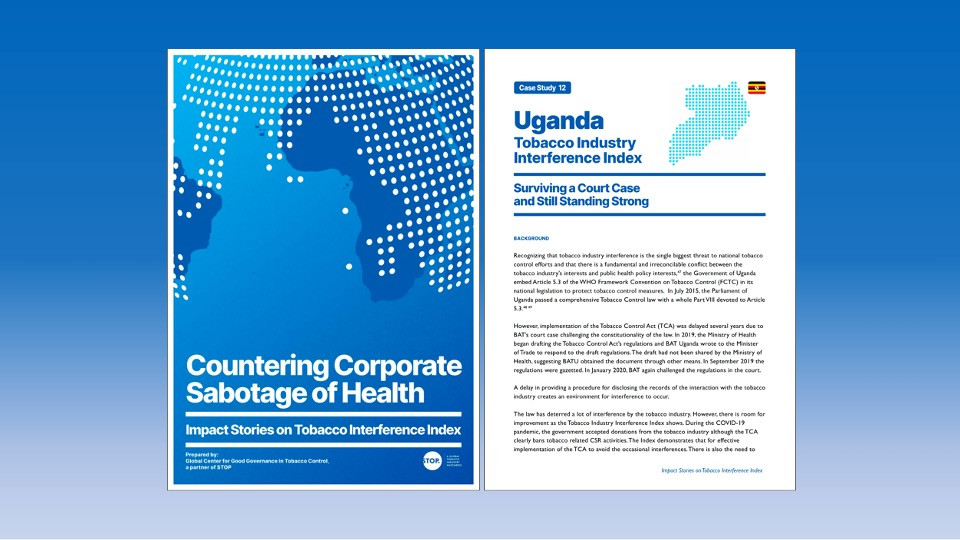Surviving a Court Case and Still Standing Strong

“The tobacco industry knows Uganda’s tobacco control laws is one of the strongest in the world which includes measures to curb industry interference. That is why it is resorting to tactics to prevent its implementation, including court challenges. Exposing the industry and implementing the law is important to protect our people.”
Robinah Kaitiritimba
Executive Director, Uganda National Health Consumers' Organisation
Background
Recognizing that tobacco industry interference is the single biggest threat to national tobacco control efforts and that there is a fundamental and irreconcilable conflict between the tobacco industry’s interests and public health policy interests,[i] the Government of Uganda embed Article 5.3 of the WHO Framework Convention on Tobacco Control (FCTC) in its national legislation to protect tobacco control measures. In July 2015, the Parliament of Uganda passed a comprehensive Tobacco Control law with a whole Part VIII devoted to Article 5.3.[ii] [iii]
However, implementation of the Tobacco Control Act (TCA) was delayed several years due to BAT’s court case challenging the constitutionality of the law. In 2019, the Ministry of Health began drafting the Tobacco Control Act’s regulations and BAT Uganda wrote to the Minister of Trade to respond to the draft regulations. The draft had not been shared by the Ministry of Health, suggesting BATU obtained the document through other means. In September 2019 the regulations were gazetted. In January 2020, BAT again challenged the regulations in the court.
A delay in providing a procedure for disclosing the records of the interaction with the tobacco industry creates an environment for interference to occur.
The law has deterred a lot of interference by the tobacco industry. However, there is room for improvement as the Tobacco Industry Interference Index shows. During the COVID-19 pandemic, the government accepted donations from the tobacco industry although the TCA clearly bans tobacco related CSR activities. The Index demonstrates that for effective implementation of the TCA to avoid the occasional interferences. There is also the need to put in place procedures for disclosing the requests and records of interactions between the industry and the government, when it does occur, for effective transparency as enshrined in Section 20(2) of the Tobacco Control Act (TCA).
Launch of the Uganda Tobacco Industry Interference Index
The Uganda National Health Consumers' Organisation (UNHCO) launched the 2021 Index in November attended by Ministry of Health officials, members of parliament, Uganda Cancer Institute, Cancer Society, media, tobacco control advocates and youths.
The launch The Chairperson of the Parliamentary Committee on Non-Communicable Diseases was the chief guest at the launch of the index and he stressed that policy and law are the best options to scale down non-communicable diseases.[iv] The Commissioner of Non-Communicable Diseases said the index was timely as there is a gap emphasised the need to address prevalence of tobacco use at the launch of the Tobacco Industry Interference Index.
[v]
We are committed to address the risk factors associated with non-communicable diseases.
The launch of the index indicated the need to provide further guidance to government officials when they need to interact with the tobacco industry in accordance with Part VIII of the TCA. With strong commitment from the Ministry of Health to protect the health measures from industry interference,[vi] the process of drafting an addendum of guidelines to interact with the industry began late 2021.
The government should put in place a procedure for disclosing the records of the interaction (such as a letter requesting audience with a government ministry or agency, agenda, attendees, minutes and outcome) with the tobacco industry and its representatives. This could be included in the Terms of Reference for the Tobacco Control Committee rather than amending the TCA and regulations which may take time. Penalties for unnecessary interactions with tobacco industry and its representatives has been provided in the law and this should be enforced.
The role of civil society is crucial in the development and implementation of tobacco control efforts, especially in monitoring the tobacco industry and exposing its various tactics to interfere and undermine the implementation of Uganda strong law.
About Uganda National Health Consumers' Organisation: UNHCO is a non-governmental advocacy organization that exists to promote full integration and implementation of the rights-based approach in Uganda’s health sector through meaningful citizen-duty bearer engagement in healthcare planning and delivery. It envisions a Uganda where the healthcare system guarantees full enjoyment of the right to health by all people.
[i] WHO-AFRO. Uganda intensifies fight against tobacco. 10 February 2020. Available from: https://bit.ly/3wO8QHH
[ii] Parliamentary Hansard reports for 28th July 2015
[iii] The Republic of Uganda. Tobacco Control Act 2015, Part VIII. Available from: https://bit.ly/30fE1Jh
[iv] Youtube. UNHCO Launches Uganda Tobacco Industry Interference Index 2021 (Video). 24 November 2021. Available from: https://bit.ly/3NegksN
[v] Twitter. UNHCO-Uganda. 24 Nov 2021. Available from: https://bit.ly/3NBiP8P
[vi] WHO FCTC Article 5.3 Guiding Principle 1
